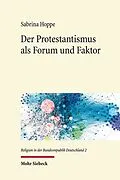Sabrina Hoppe's analysis of socially-orientated Protestantism's networks sheds light on its aspirations and self-image, and describes its role in debates about the socio-ethical transformation processes taking place.
The re-orientation of German society in the foundation phase of the Federal Republic was shaped by numerous protestant initiatives. The establishment of the German Protestant Church Conference, the idea of a protestant academy, publications such as "Christ und Welt" and the "Sonntagsblatt" as well as study facilities and lexicon projects specified the character of Protestantism in the republic's early days. Sabrina Hoppe's analysis of this socially-orientated Protestantism's networks sheds light on its aspirations and self-image, and describes its role in debates about the socio-ethical transformation processes taking place. Starting with Eberhard Müller and Friedrich Karrenberg's positions in these networks, she devotes herself to Protestantism's perception of itself in its dual function as mediation forum and opinion-forming factor.
Autorentext
Geboren 1985; Studium der Ev. Theologie; 2012-16 Projektkoordinatorin, Mitarbeiterin und Doktorandin der FOR 1765 "Der Protestantismus in den ethischen Debatten der Bundesrepublik Deutschland 1949-1989" an der LMU München; 2017 Promotion; seit 2019 Pfarrerin in Prien am Chiemsee.
The re-orientation of German society in the foundation phase of the Federal Republic was shaped by numerous protestant initiatives. The establishment of the German Protestant Church Conference, the idea of a protestant academy, publications such as "Christ und Welt" and the "Sonntagsblatt" as well as study facilities and lexicon projects specified the character of Protestantism in the republic's early days. Sabrina Hoppe's analysis of this socially-orientated Protestantism's networks sheds light on its aspirations and self-image, and describes its role in debates about the socio-ethical transformation processes taking place. Starting with Eberhard Müller and Friedrich Karrenberg's positions in these networks, she devotes herself to Protestantism's perception of itself in its dual function as mediation forum and opinion-forming factor.
Autorentext
Geboren 1985; Studium der Ev. Theologie; 2012-16 Projektkoordinatorin, Mitarbeiterin und Doktorandin der FOR 1765 "Der Protestantismus in den ethischen Debatten der Bundesrepublik Deutschland 1949-1989" an der LMU München; 2017 Promotion; seit 2019 Pfarrerin in Prien am Chiemsee.
Titel
Der Protestantismus als Forum und Faktor
Untertitel
Sozialethische Netzwerke im Protestantismus der frühen Bundesrepublik
Autor
EAN
9783161561375
Format
E-Book (pdf)
Hersteller
Genre
Digitaler Kopierschutz
Adobe-DRM
Dateigrösse
3.65 MB
Anzahl Seiten
448
Lesemotiv
Unerwartete Verzögerung
Ups, ein Fehler ist aufgetreten. Bitte versuchen Sie es später noch einmal.
